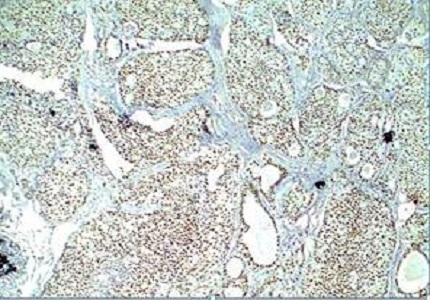BRCA1 Positivity in Triple Negative Breast Cancers: A Prospective Study in Tertiary Care Cancer Hospital
Abstract
Objectives: In the present study we investigated the BRCA1, Estrogen receptors status (ER), progesterone receptor status (PR) and human epidermal growth factor receptor (Her2neu) expression in selected patients with higher probability of BRCA1 positivity. The association of BRCA1 positivity and Triple Negative Breast Cancer (TNBC) status was also demonstrated.
Materials and Methods: The study was conducted on 100 cases of breast cancer specimen received in department of Pathology, SGRDIMSAR, Amritsar. Histopathological typing and grading was done followed by immunohistochemistry for BRCA1, ER, PR and Her2neu.
Results: All the tumors were infiltrating ductal carcinoma NOS. 4 cases were of grade I, 34 cases as grade II and 62 as grade III. ER+ PR+ Her2neu-ve cases comprised of 33% and triple negative being 38%. BRCA1 positivity was seen in 36% patients. BRCA1 positivity was significantly higher in triple negative primary tumours as compared to other groups. (23/38- 60.5% vs 13/62-20.9% respectively) with significant p =0.009.
Conclusion: Triple Negative Breast Cancer (TNBC) patients are associated with poor prognostic factors and are more likely to be BRCA1 positive. Such BRCA1 identification is not only important in management of the patient for contralateral breast cancer and ovarian cancer but also blood relatives of such patients. As the relatives of such patient have 50% of increased chances of BRCA1 expression.
Downloads
References
2. Clays-Tagoe BNL, Yarney J, Kenu E, Amanhayian ONAK, Enchill E, Obeng I. Profile of cancer patients seen at Korle Bu teaching hospital in Ghana (A cancer registry review). BMC Research Notes. 2014;7:577. DOI:10.1186/1756-0500-7-577. [PubMed]
3. Chen S, Parmigiani G. Meta-analysis of BRCA1 and BRCA2 penetrance. J Clin Oncol. 2007 April 10;25(11):1329–33. DOI:10.1200/JCO.2006.09.1066. [PubMed]
4. Graeser MK, Engel C, Rhiem K.. Contralateral breast cancer risk in BRCA1 and BRCA2 mutation carriers. J Clin Oncol. 2009 Dec 10;27(35):5887–92. DOI:10.1200/JCO.2008.19.9430. [PubMed]
5. Gronwald J, Tung N, Foulkes WD. Tamoxifen and contralateral breast cancer in BRCA1 and BRCA2 carriers: an update. Int J Cancer. 2006 May 1;118(9):2281–4. DOI:10.1002/ijc.21536. [PubMed]
6. Fuksa L, Micuda S, Grim J, Ryska A, Hornychova H. Predictive biomarkers in breast cancer: their value in neoadjuvant chemotherapy. Cancer Invest. 2012;30:663–78. [PubMed]
7. Thibault C, Khodari W, Lequoy M, Gligorov J, Belkacémi Y. HER2 status for prognosis and prediction of treatment efficacy in adenocarcinomas: A review. Crit Rev Oncol Hematol. 2013;88:123–33. [PubMed]
8. Dawson SJ, Provenzano E, Caldas C. Triple negative breast cancers: clinical and prognostic implications. Eur J Cancer. 2009 Sep;45(1):27–40. DOI:10.1016/SO959-8049(09)70013-9.
9. Metzger-Filho O, Tutt A, de Azambuja E, Saini KS, Viale G, Loi S, Bradbury I, Bliss JM, Azim HA, Jr, Ellis P, Di Leo A, Baselga J, Sotiriou C, Piccart-Gebhart M. Dissecting the heterogeneity of triple-negative breast cancer. J Clin Oncol. 2012 May 20;30(15):1879–87. DOI:10.1200/JCO.2011.38.2010.
10. Peshkin BN, Alabek ML, Isaacs C. BRCA1/2 mutations and triple negative breast cancers. Breast Dis. 2010;32(1):25–33. DOI:10.3233/BD-2010-0306. [PubMed]
11. Rosai J. The Breast. In: Rosai and Ackerman’s Surgical Pathology. 10th Edition (Vol. 2). New York: Mosby (Elsevier);2012.p.1719-20.
12. Shetty P. India faces growing breast cancer epidemic. Lancet. 2012 March 17;379(9820):992-3. DOI:http://dx.org/10.1016/S0140-6736(12)60415-2. [PubMed]
13. Al-Mulla F, Abdulrahman M, Varadharaj G, Akther N, Anim JT. BRCA 1 gene expression in breast cancer: a correlative study between real time RT-PC immunohistochemistry. J Histochem Cytochem. 2005 May;53(5):621-9. DO:10.1369/jhc.4A6544.2005. [PubMed]
14. Burkadze G, Khardzeishvili, Gudadze M, Tsikhiseli G, Turashvili G. Immunohistochemical expression of BRCA 1 protein in invasive ductal carcinoma of breast. Georgian Med News. 2010 July;184:51-60.
15. Lakhani SR, Gusterson BA, Jacquemier J, Sloane JP, Anderson TJ, Vijver MJ, et al. The pathology of familiar breast cancer histological features of cancers in families not attributable to mutations in BRCA1 or BRCA2. Clin Cancer Res. 2000 March;6(3):782–9.
16. Palacios J, Honrado E, Osorio A, Cazorla A, Sarrio D, Barroso A, et al Immunohistochemical Characteristics Defined by Tissue Microarray of Hereditary Breast Cancer Not Attributable to BRCA1 or BRCA2 Mutations: Differences from Breast Carcinomas Arising in BRCA1 and BRCA2 Mutation Carriers. Clin Cancer Res. 2003 Sep1;9(10):3606–14.
17. Atchley DP, Albarracian CT, Lopez A, Valero V, Amos CL, Gonzalez-Angulo AM. Clinical and Pathologic Characteristics of Patients with BRCA Positive and BRCA-Negative Breast Cancer. J Clin Oncol. 2008;26(2):4282-8.
18. Palomba G, Budroni M, Olmeo N, Atzori F, Ionta TM, Pisano M et al. Triple negative breast cancer frequency and type of BRCA mutation: Clues from Sadinia. Oncol Lett. 2014 April;7(4): 948-52. [PubMed]
19. Mote PA, Leary JA, Avery KA, Sandelin K, Chenevix-Trench G, Kirk JA et al. Germ-line mutations in BRCA1 or BRCA2 in the normal breast are associated with altered expression of estrogen-responsive proteins and the predominance of progesterone receptor A. Genes Chromosomes Cancer. 2004 Mar;39(3):236–48. [PubMed]
20. Veronesi A, de Giacomi C, Magri MD, Lombardi D, Zanetti M, Scuderi C, et al. Familial breast cancer: characteristics and outcome of BRCA 1–2 positive and negative cases. BMC Cancer. 2005 July;5:70. DOI:10.1186/1471-2407-5-70. [PubMed]



 OAI - Open Archives Initiative
OAI - Open Archives Initiative


